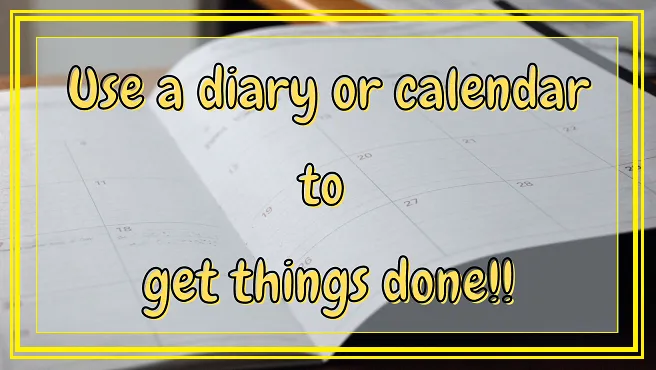On Tuesday, I started this series of posts with Why You Need To Know How To Prioritize.
Today, I want to emphasize the importance of keeping a diary or working with a calendar.
Many people still carry a physical diary with them and prefer to plan their schedule by using a diary.
But with the technology of today, we can also make use of a calendar.
So, let's get right to it...
Using a Diary or Calendar.
Now that you have your "to-do" list ready, and you have prioritized your activities, knowing what to do and in what order, it is now time to determine when you are going to do it.

Photo by Eric Rothermel on Unsplash
There is no way around it, the best and most effective way to commit a definite time to specific activities is by using a diary or calendar.
Four Good Reasons To Use A Diary/Calendar.
To Commit Yourself:
- Once you commit yourself and you put it in writing, you put yourself on the spot. Especially when you make it known to everybody that you are working according to a diary, you eliminate any excuses you might have had.
You Cover All The Bases:
- Every goal that you set, every activity you have, requires certain action steps to be taken. By scheduling each and every step in your diary, you are assured of taking every step. You will also prevent getting caught at the last minute, having to rush through endless activities to meet deadlines or to achieve any given goal, just because you got caught up with less important activities.
You Can Be Single-Minded:
- When you are working according to a well-planned schedule, you reduce undue stress and anxiety. By knowing that you are busy with one specific activity, and the given time is specifically designated to that activity and that activity alone, you can be more focused. There will be no need to stress about how and when you need to get all the other activities done and the chaos surrounding that, seeing that you have everything properly scheduled.
Avoid Overwhelming Yourself With Too Many Activities Or Double Booking:
- Have you ever double-booked for two meetings at the same time? Or have you agreed to meet someone, while you were actually supposed to be doing something else? If you properly maintain your diary, these situations can be avoided altogether. It is recommended to have a diary which you can keep with you at all times.
Properly using a diary and/or calendar will ensure that you can stay calm and get done things efficiently. You will feel more in control, organized and professional and that is also how others will see you. So you automatically start adding quality to your life.
I recall, many years ago, I was doing business with a German businessman in Johannesburg. This man was extremely organized, professional, and efficient. I was always impressed with how calm and relaxed he was.
What was his secret?
Let me tell you: his days were properly planned, and he strictly followed his schedule. If you would make an appointment with him, he would immediately be able to tell you in advance when he could see you, and how much time he would have available for you. If the appointment was for 30 minutes, and you arrived 5 minutes late, he would immediately (but friendly though) point out that you now only had 25 minutes available to see him, as he would then have something else to attend to.
And when your time was up, it was up. He would politely point out that we were out of time. He would ask to be excused and then he would calmly move on to his next activity. It made such an impression on me; I can remember this man to the finest detail.
Personally, I have always had the habit to be at least 10 to 15 minutes early for any meeting or appointment, to give me a buffer if there would be any delay on the road.
But I saw firsthand how this German guy operated when we had a meeting one day where a third party was involved too, who arrived about ten minutes late.
He politely informed the guy about the time factor and that there were only 20 minutes left for him to do his presentation as we were supposed to have a 30-minute meeting.
At first, I almost got the impression that the other guy didn't take this too seriously and just continued as normal...which I thought was a bit arrogant and rude. But the German remained calm and relaxed and exactly 30 minutes later, he calmly asked us to end the meeting and please excuse him, as he had other activities scheduled that needed his attention, and he calmly went his way.
The other guy appeared a bit confused for a moment. It was almost as if he was caught off-guard...and there were signs of being slightly irritated...but he was the one being late!
But I, on the other hand, was quite impressed by the way the situation was handled and I learned something from it.
Up until that day, I would often find myself in situations where other people were late. It frustrated me, as it would often mess up my schedule for the rest of the day and it would end up in a mad running around to try and catch up again.
Why? Because I didn't want to offend the other person.
But this experience made me think. All the time, I would be the one getting irritated and then anxious to try and catch up with my own schedule. Yet, the other person just carries on with his life, not even aware of the chaos he caused in my day...maybe they couldn't care either.
But seeing this, made me realize that I was the one who allowed it to happen. There and then, I decided to start applying what I have learned. If someone would be offended by that...well...maybe next time you'll be on time.
Let's face it...life happens. Things go wrong. But then at least have the decency to notify the other party that you either can't make it or that you would be late. Then both parties can decide how to adjust and nobody has to feel offended or get irritated.
10 Tips For Effective Scheduling.
Consider your goals as a priority when scheduling (otherwise, what is the sense of having goals?). Review your plan and milestones weekly.
Include a starting time as well as an ending time for each activity.
Group all related tasks in sequence to save time. Jumping around between unrelated tasks is inefficient and wastes time.
If possible, spread your “A” tasks over the entire week to stand a better chance of getting them done.
Schedule each day around key events and fixed commitments.
Write down every commitment, including personal ones.
Check your schedule each night before retiring for the night, to prevent you from starting your “normal” day at 08h00 at the office, and missing that all-important meeting at 07h30 (that you forgot about...lol).
Schedule your major tasks for completion before deadline delivery, to allow for emergencies, mistakes, and underestimating.
Always block out some “open time” to accommodate unexpected events or commitments. This time can always be filled with some “A” task when the time arrives and that time slot is still open.
Don’t restrict your schedule to career activities only. You should also include family, social and recreational goals and activities into your schedule. This is essential to maintain a balanced lifestyle and should be included when you do your planning.

Photo by Gaining Visuals on Unsplash
Remain Flexible
This does not guarantee plain sailing though! Here are some “evil gremlins” that might slip in and mess with your perfectly worked-out schedule.
Some activity takes longer than expected.
You can get interrupted
Unexpected conflict might occur, where two things just come up unexpectedly at the same time.
You might be tired at a crucial time.
Someone else doesn't show up for a meeting.
You can get lost on your way to a venue.
On your way to an appointment, you might get stuck in heavy traffic.
You might be faced with things to do that you have not anticipated.
Waiting time. (Meetings, seminars, flights, etc.)
Canceled appointments.
These are just to name a few, there are many more. Look over the ones mentioned here (and any others you can come up with), and determine which three of these normally cause you to waste the greatest amount of time.
Once you can point out some stumbling blocks that pop up frequently, you can try to find a way to work around it or even eliminate it completely if possible.
Then see if you can identify more and repeat the process.
Our days will never be without any hick-ups, emergencies, or unforeseen events. But we can take control over that which we do have control over, and you'll be surprised to see what a difference it can make.
And with that, I'll end this post for today. If you have ever had a battle with time management, I hope you now have enough to get started and see if you can gain more control over your time.
Apply what we've discussed in these two posts so far until I publish the next post on this topic on Tuesday, March 22, when we'll talk about how you can take even more control over your time.
Thank you for reading my post.
I do appreciate it.